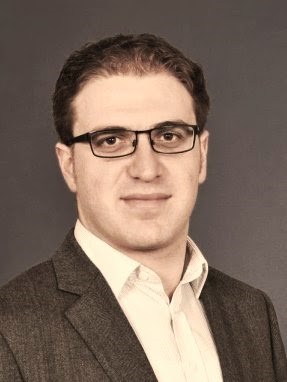Dr. Deniz Gunduz (Imperial College, UK) - iCore & CommNet2 Workshop Speaker
 Deniz Gunduz received his Ph.D. degree in electrical engineering from NYU Polytechnic School of Engineering in 2007.
After his PhD he served as a postdoctoral research associate at Princeton University, and as a consulting assistant professor at Stanford
University, and as a researcher at CTTC, Spain. Currently he is a Reader in Information Theory and Communications in the Electrical
and Electronic Engineering Department of Imperial College London, and leads the Information Processing and Communications Lab. Dr.
Gunduz is an Editor of the IEEE Transactions on Communications, and IEEE Transactions on Green Communications and Networking. He
served as a General Co-chair of the 2016 Information Theory Workshop and a TPC Co-Chair of the 2017 IEEE Wireless Communications and
Networking Conference, PHY and Fundamentals Track. He is the recipient of a Starting Grant of the European Research Council (ERC), the
2014 IEEE Communications Society Best Young Researcher Award for the Europe, Middle East, and Africa Region, Best Paper Award at the
2016 IEEE Wireless Communications and Networking Conference (WCNC), and the Best Student Paper Award at the 2007 IEEE International
Symposium on Information Theory (ISIT). His research interests are in the areas of information theory, communication networks, and
security and privacy in cyber-physical systems.
Deniz Gunduz received his Ph.D. degree in electrical engineering from NYU Polytechnic School of Engineering in 2007.
After his PhD he served as a postdoctoral research associate at Princeton University, and as a consulting assistant professor at Stanford
University, and as a researcher at CTTC, Spain. Currently he is a Reader in Information Theory and Communications in the Electrical
and Electronic Engineering Department of Imperial College London, and leads the Information Processing and Communications Lab. Dr.
Gunduz is an Editor of the IEEE Transactions on Communications, and IEEE Transactions on Green Communications and Networking. He
served as a General Co-chair of the 2016 Information Theory Workshop and a TPC Co-Chair of the 2017 IEEE Wireless Communications and
Networking Conference, PHY and Fundamentals Track. He is the recipient of a Starting Grant of the European Research Council (ERC), the
2014 IEEE Communications Society Best Young Researcher Award for the Europe, Middle East, and Africa Region, Best Paper Award at the
2016 IEEE Wireless Communications and Networking Conference (WCNC), and the Best Student Paper Award at the 2007 IEEE International
Symposium on Information Theory (ISIT). His research interests are in the areas of information theory, communication networks, and
security and privacy in cyber-physical systems.
Talk Title: "Contents on the Move: Content Caching and Delivery at the Wireless Network Edge "
Abstract: Caching has been successfully exploited in the Internet for many years through content distribution networks. With the growing number of wireless users and their increasing appetite for high rate content, particularly video streaming applications, caching is now moving towards the wireless network edge, where popular contents are stored either at access points, or directly at user devices. Caching at the network edge reduces both the latency of content delivery and the traffic on the backhaul links, and increases spatial reuse, practically turning relatively abundant and cheap cache memories into extremely valuable and scarce wireless bandwidth. In this talk I will present some of our recent contributions to wireless content caching and delivery, including coded content delivery to heterogenous devices (e.g., mobiles phones, tablets, laptops), coded delivery over noisy channels (e.g. broadcast and interference channels), and proactive wireless caching of dynamic content.